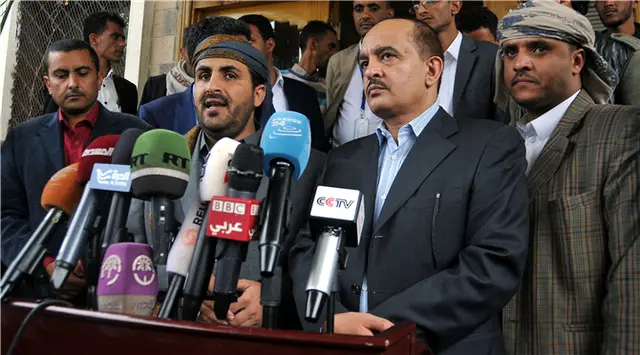Yemeni rival delegations on Friday disagreed over a previously agreed agenda for the UN-sponsored peace talks held in Kuwait, sources close to the negotiations told Xinhua.
The dispute rose concerns over international efforts to end more than one year of civil war between the Saudi-backed Yemeni government of President Abd-Rabbu Mansour Hadi and its foe, the Shiite Houthi group and former Yemeni President Ali Abdullah Saleh.
The agenda was first declared in March by the United Nations, and was repeated publicly in the opening ceremony of the negotiations in Kuwait on Thursday by the UN envoy to Yemen, Ismail Ould Cheikh Ahmed.
It includes five points, stating that Houthis should withdraw from Sanaa and other cities, handing over light and heavy weapons to the government, setting temporary security measures, restoring the state institutions and ministries to the government, establishing a committee on political prisoners and resumption of a comprehensive political dialogue.
The envoy said in the opening that the five points were based on the UN Security Council resolution 2216 on Yemen conflict.
However, the Houthi and Saleh's delegates expressed reservations, and stipulated the formation of a new national sharing government before implementing those points, according to the sources monitoring the talks.
The move was rejected by the government's negotiators, said the sources on condition of anonymity.
In the meantime, both sides traded accusations over breaching the cease-fire and asked to cement the truce before going ahead with the discussion.
The session will adjourn on Saturday morning, the sources added.
Houthi and Saleh militias stormed the Yemeni capital Sanaa in September 2014, and forced Hadi and his government to exile. They are now controlling most of the country's northern provinces.
The United Nations issued the resolution 2216 in a bid to restore the power to Hadi's government.
Last March, Hadi's government authorized a Saudi-led coalition to enforce the resolution and bring Sanaa back to the control of the internationally recognized government.
The coalition and the government forces have taken four southern provinces from Houthi and Saleh militias in July last year.
The coalition-backed government forces have advanced in the past two months to northeast suburbs of Sanaa, ready to storm the capital once the talks collapse.
The civil war has so far killed over 6,000 Yemenis, mostly civilians, displaced over two million and injured around 35,000 people, according to the latest UN statistics.
 简体中文
简体中文

